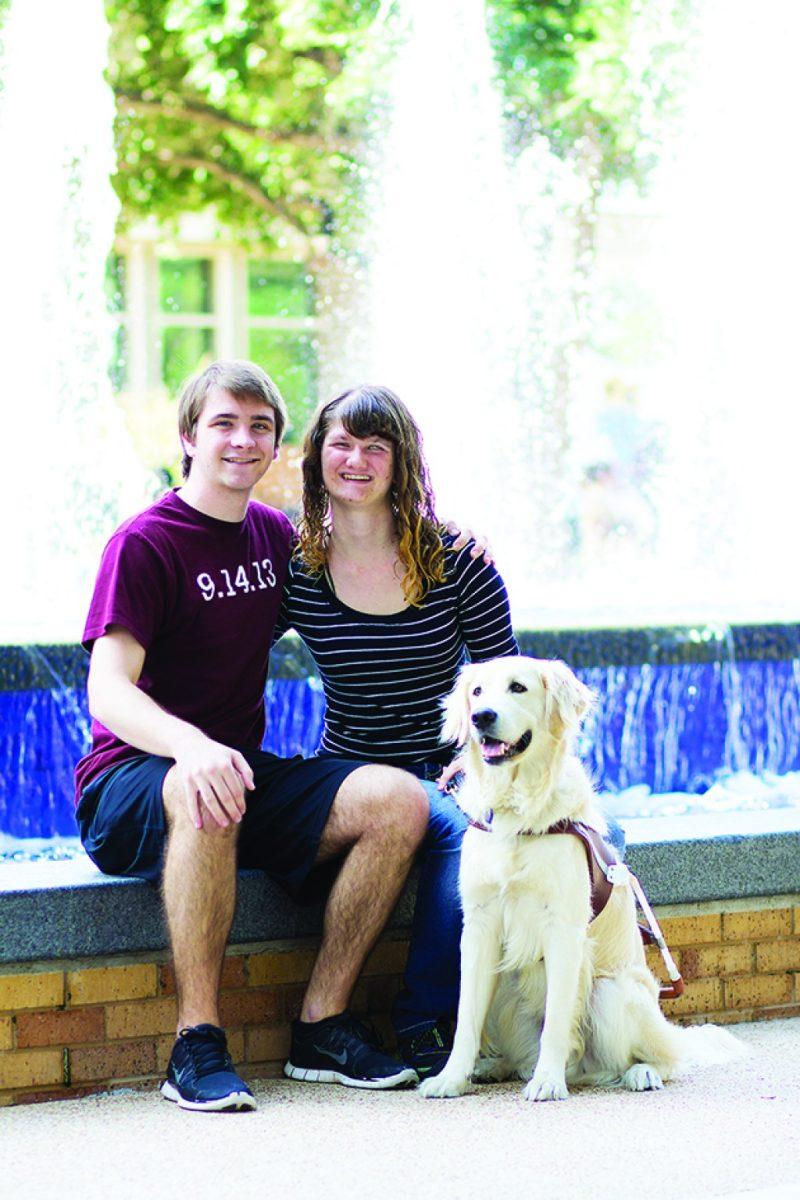As one of the largest universities in the United States, Texas A&M can be a difficult campus to navigate. Even students with the distinct advantage of vision can get lost from time to time.
For Kaitlyn Kellermeyer, an international studies sophomore who lost her vision last year, navigating such a large campus can be even more difficult.
Kellermeyer said she is seeking to help remedy the challenges of getting around campus for herself and other students with visual impairments by getting wind chimes put in several key locations on campus. These wind chimes will act as auditory markers to help students with visual impairments identify where they are on campus.
Kellermeyer said she approached Joseph Hood, sophomore political science major and student senator, with her idea in the summer, and shortly after a bill was drafted.
The bill was brought before Student Senate where it was passed unanimously Wednesday evening.
Kellermeyer said the project is an effort to increase campus accessibility.
“We’ve had several meetings with visually impaired people all across campus, and even just some people in the Bryan-College Station community, discussing not only the wind chime project but also what other accessibility things need to happen to make campus more accessible for the blind,” Kellermeyer said.
Hood said ease of navigation is critical.
“You have students who are missing out on the A&M experience because the campus isn’t accommodating enough,” Hood said. “That’s really tragic.”
Kellermeyer said she knows students at other campuses with visual impairments who decided not to attend A&M because of its size.
“As a blind person, it is such a huge factor because mobility is so challenging,” Kellermeyer said. “It’s sad to me, because when you get past that, this is one of the most welcoming environments. I hope that [the wind chimes] will help students coming in and make it easier for them to be part of the Aggie family.”
Because Kellermeyer lost her sight so recently, she said she is still adjusting to the changes that come with losing such an important sense.
“There’s been a lot of challenges,” Kellermeyer said. “You really have to relearn how to do everything. It’s like starting over from being a child. You have to relearn how to get yourself from point A to point B, how to read, how to write, how to take care of yourself. The adjustment has been a lot of not knowing what I need until I need it, and then figuring out how to get it.”
Kellermeyer said one of the things she misses the most and took advantage of when she had sight was the ability to navigate.
“I think the one thing I took for granted was just being able to get around campus,” Kellermeyer said. “I’ve been able to work out my classes and figuring out how to do things like that. There are accessibilities for things like movies or for books, so I’m able to keep up with culture. But the ability to walk in a straight line is something that I never knew how much I appreciated until I lost it. Just simple things like that.”
Kellermeyer said despite her disability, the students on campus have made her feel included and welcome.
“People here are just incredible,” Kellermeyer said. “If people see me lost, they’ll stop me or I’ll stop them and they’re more than happy to help. Sometimes I have people fighting to give me their seat on the bus, which is awkward, but it’s just how much people care and how aware they are. I feel just very respected and included here.”
Justin de Leon, graduate of the Postsecondary Access and Training in Human Services program, also has a visual impairment and is an independent living facilitator at the Brazos Valley Center for Independent Living. De Leon said he found navigating the campus difficult, but the wind chimes would help.
“I would say that identifying buildings is challenging,” de Leon said. “Wind chimes, I feel, would be helpful to know where the entrances are at a distance or things of that nature.”
Kellermeyer said the passage of the bill represented the end of a long journey.
“I can kind of see it as a concrete part of campus now, I can see it as a change that’s going to be made,” Kellermeyer said. “I’m really excited for the day when I can walk from one end of campus to the other and not feel so worried about getting lost because I’ll have this extra support, this extra little bit of help. And not only the help, but the knowledge that so may people supported it and that so many people cared enough to make it happen.”
Travis Walters, biomedical sciences senior and student services chair, said the bill will now go to the executive cabinet where, if passed, it will be presented to A&M administrators.
Sight through sound
October 22, 2014
Sarah Lane — THE BATTALION
Joseph Hood and Kaitlyn Kellermeyer teamed up to write the Student Senate bill that advocates for wind chimes to help visually impaired students find their way around campus.
0
Donate to The Battalion
$1765
$5000
Contributed
Our Goal
Your donation will support the student journalists of Texas A&M University - College Station. Your contribution will allow us to purchase equipment and cover our annual website hosting costs, in addition to paying freelance staffers for their work, travel costs for coverage and more!
More to Discover










